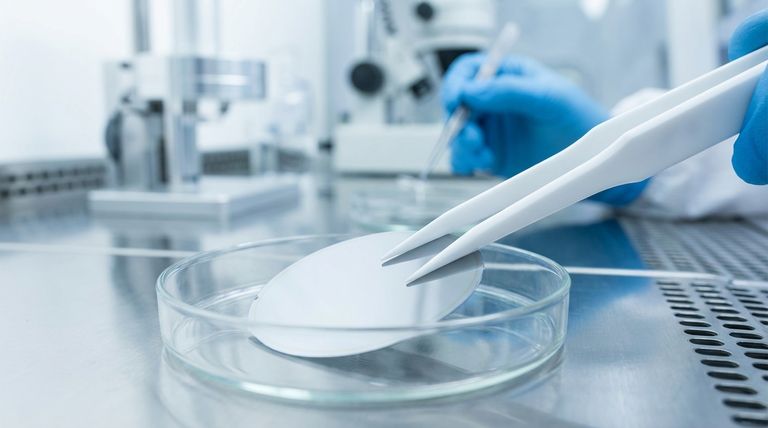Virgin PTFE is the material of choice for applications where absolute purity and unwavering performance consistency are non-negotiable. It is preferred because it is manufactured directly from pure resin without any recycled materials, fillers, or additives. This guarantees that its exceptional chemical, thermal, and electrical properties are not compromised, making it essential in highly sensitive industries.
While all PTFE offers remarkable properties, the decision to use virgin grade comes down to one critical factor: the absolute intolerance for contamination. Its value lies not just in what it is, but in what it isn't—it contains no foreign materials that could compromise a sensitive process or product.

The Foundational Properties of All PTFE
To understand what makes virgin PTFE special, we must first recognize the baseline characteristics of the material itself. All Polytetrafluoroethylene (PTFE) grades share a unique combination of high-performance traits.
Unmatched Chemical Inertness
PTFE is famously non-reactive and resistant to nearly all chemicals, acids, and corrosive agents. This makes it an ideal material for creating protective barriers and components used in harsh chemical environments.
Extreme Thermal Stability
As the most thermally-stable plastic, PTFE retains its core properties across an exceptionally wide temperature range, from a cryogenic -200°C to a high of +260°C (-328°F to +500°F).
Superior Surface and Electrical Characteristics
PTFE has one of the lowest coefficients of friction of any solid material, giving it excellent non-stick and sliding properties. It is also a superior electrical insulator that resists moisture penetration, ensuring long-term durability in electronic applications.
Why "Virgin" Grade Is a Critical Distinction
The term "virgin" signifies that the PTFE is pure and uncontaminated. This distinction is the primary reason it is mandated for certain critical applications where filled or recycled grades are unsuitable.
Guarantees of Absolute Purity
The defining feature of virgin PTFE is its composition—it contains no fillers or reprocessed material. In industries like semiconductor manufacturing or pharmaceuticals, even microscopic impurities can lead to catastrophic failures or product contamination. Virgin grade eliminates this risk.
Unwavering Performance Consistency
Because it is made from pure, first-run resin, every batch of virgin PTFE exhibits identical properties. This reliability is crucial for high-precision manufacturing and medical devices where performance variation is unacceptable.
Biocompatibility and Regulatory Approval
Virgin PTFE is biocompatible and FDA-approved, making it safe for direct contact with food, beverages, and medical products. It is used extensively for life-saving machinery, including catheters and syringes, where material integrity is paramount.
Understanding the Trade-offs and Limitations
Choosing virgin PTFE requires acknowledging its specific place in the materials landscape. Its purity comes with certain considerations that make it ideal for some tasks but less so for others.
Higher Material Cost
As a pure, premium material, virgin PTFE is inherently more expensive than recycled grades or PTFE compounds that include less costly fillers. This cost is justified only when its specific benefits are required.
Specific Mechanical Properties
While its purity is an asset, it also means virgin PTFE is softer and more prone to creep (deformation under sustained load) than filled PTFE grades. Additives like glass, carbon, or bronze are often blended into PTFE to enhance specific mechanical properties like wear resistance or compressive strength for demanding industrial parts.
Making the Right Choice for Your Application
Selecting the correct grade of PTFE is a strategic engineering decision based entirely on the demands of the final application.
- If your primary focus is purity and non-contamination: Virgin PTFE is the only acceptable choice for food, medical, semiconductor, and pharmaceutical applications.
- If your primary focus is enhanced mechanical performance: A filled PTFE grade (e.g., glass-filled for rigidity or carbon-filled for conductivity) will likely provide better results for components like bearings or high-load seals.
- If your primary focus is general-purpose use on a budget: A mechanical or recycled grade of PTFE can offer a cost-effective solution for less-critical industrial applications where absolute purity is not required.
Ultimately, selecting virgin PTFE is a deliberate choice to prioritize purity and consistency above all other considerations.
Summary Table:
| Aspect | Virgin PTFE | Filled/Recycled PTFE |
|---|---|---|
| Purity | 100% pure, no fillers or contaminants | May contain fillers or reprocessed material |
| Chemical Resistance | Uncompromised inertness | May be reduced by additives |
| Thermal Stability | Stable from -200°C to +260°C | Can vary based on filler type |
| Ideal For | Semiconductor, medical, pharmaceutical applications | General industrial, mechanical parts |
| Cost | Higher | Lower |
Need high-purity PTFE components for your critical applications? KINTEK specializes in manufacturing precision virgin PTFE seals, liners, and labware for the semiconductor, medical, and pharmaceutical industries. Our custom fabrication ensures your components meet the strictest purity and performance standards—from prototypes to high-volume orders. Contact our experts today to discuss your project requirements!
Visual Guide

Related Products
- Custom PTFE Parts Manufacturer for Teflon Parts and PTFE Tweezers
- Custom PTFE Sealing Tapes for Industrial and High Tech Applications
- Custom PTFE Bottles for Diverse Industrial Applications
- Custom PTFE Parts Manufacturer for Teflon Containers and Components
- Custom PTFE Teflon Balls for Advanced Industrial Applications
People Also Ask
- What industrial applications utilize expanded PTFE? Sealing, Filtration & Insulation Solutions
- Why is flow regulation important in control systems? Ensure Stability, Safety, and Efficiency
- What is the coefficient of friction of PTFE? Unlocking Its Slippery Secrets for Your Designs
- How does PTFE contribute to semiconductor manufacturing? Ensure Purity and Prevent Contamination
- How is PTFE processed after suspension polymerization? From Raw Polymer to Industrial-Grade Material
- What is a notable downside of PTFE material? The Critical Trade-off in Chemical Resistance
- What is the dielectric strength of PTFE and how does it vary with thickness? A Guide to Reliable Insulation Design
- What is expanded PTFE and what are its key properties? A Guide to the Microporous Wonder Material



















